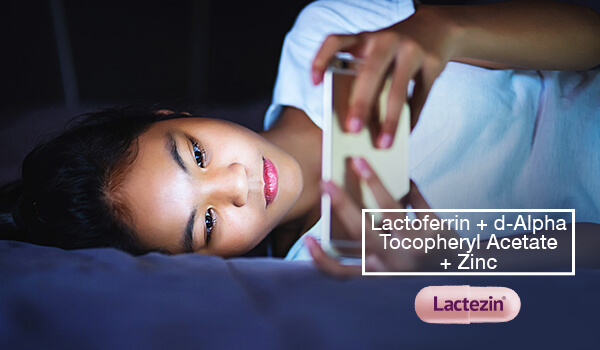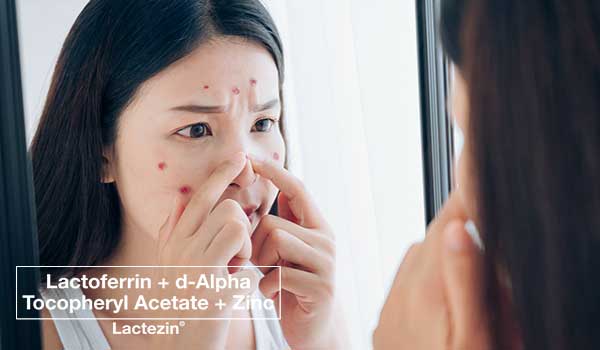Your Screen and Your Skin: Does Blue Light Affect Skin Health?

The next time you take a selfie, take a closer look. Zoom in a bit and check your skin. Noticed some pigmented spots? Dark patches? Dullness? Well, here’s the thing: those could be due to the high energy light coming from the sun or from the gadget you’re using. It’s called blue light.
What is blue light?
Blue light is high-energy visible (HEV) light coming from the sun, gadgets (mobile phones, tablets, computers, television) and lamps containing LED and fluorescent bulbs. It appears in spectrums of blue/turquoise and blue/violet and is highly visible (but less felt) compared to UV rays.
As everyone now spends so much time on digital devices for work, leisure, and schooling, it’s nearly impossible to avoid getting exposed to blue light. Think everyday zoom calls, Netflix marathons, online learning, and work from home. Cumulatively, the effect may not be felt right away but it does impact the skin. In fact, a study by known dermatologist Dr. Murad says that four consecutive 8-hour workdays of working in front of a computer is almost equivalent to 20 minutes of sun exposure in broad daylight. Imagine the effect it can have on your skin.
But is blue light only harmful for the eyesight?
Blue light is often associated with eye damage mainly because of the radiation that directly affects the retina. While it’s true that blue light poses harm on eyesight, it’s also a big truth that it can pose potential damage to the skin. Add to that the fact that it goes into the skin way deeper than UVA and UVB rays.
So how does blue light damage the skin?
Blue light damages the skin’s collagen and elastin through oxidative stress. This happens when flavin, a naturally occurring group of pigments in the skin, absorbs the emitted blue light. The result of this reaction creates free radicals that often cause serious damage to the skin. These free radicals penetrate the skin and “poke holes” in the collagen and elastin, damaging these protein fibers that make the skin healthy and strong. Whether it comes from indoor lighting, electronic devices, or from sunlight exposure, constant exposure to blue light does impact the skin in so many ways.
Exactly what dangers can blue light do to my skin?
-
Premature skin aging
Because of oxidative stress, skin’s collagen will degenerate. Cell shrinkage and tissue death happens. As a result, skin loses its elasticity, suppleness, and ability to regenerate new, healthier cells. This can cause unsightly wrinkles, fine lines, and dull skin texture.
-
Hyperpigmentation
Blue light disrupts the normal activities of the skin’s melanocytes which are skin cells that produce the protective skin-darkening pigments called melanin. When melanocyte cells’ normal processes get disrupted, they produce uneven and excessive skin pigmentation. This is called hyperpigmentation which manifests through sun spots which we also normally get from too much sun exposure. Abnormal melanocyte activity can also cause melasma, a skin condition that causes unsightly dark patches on the skin. Based on research, pigmentation caused by blue light is actually darker and more difficult to treat than those that are caused by UVA or UVB rays.
-
Weak skin barrier
Blue light also weakens the skin’s natural barriers. Hence, this lessens the skin’s ability to protect itself from daily stressors like pollutants, chemicals, harsh temperature, and dirt. Aside from weak skin immunity, it also impairs the skin’s ability to retain moisture and manage skin’s oil production. Inflammation, redness and swelling are some of the physical manifestations of a weak skin barrier.
-
Inability to heal the skin
Blue light suppresses the body’s production of melatonin – a chemical that makes us feel drowsy. Less melatonin makes it more difficult for the brain to put the body in sleep mode. Lack of deep, restful sleep deprives the skin of the chance to heal itself, rejuvenate, and generate new healthy cells. Blue light also disrupts the body’s circadian rhythm (the body’s sleep-wake cycle) tricking the brain to stay awake even during sleeping hours. Another reason that prevents the skin from repairing itself.
What to do to manage the damage?
Totally avoiding blue light is close to impossible because electronic gadgets, lamps, and sun exposure are already parts of our life. So how do we manage the inevitable exposure to blue light and the potential damage it can cause the skin?
-
In the evening, dim your gadget’s brightness or set your mobile phones to night mode. This lessens the emission of blue light that can disrupt your sleep.
-
Use blue light eye glasses when using the computer. This protects the thin and sensitive skin areas around your eyes.
-
Use a screen protector for your gadgets to block or dim the harmful glare of blue light.
-
Use headphones when conversing via your mobile phones so you don’t have to put your gadget too close to your face.
-
During the day, use sunscreen with titanium dioxide or zinc oxide as these are considered gold standard ingredients that can block blue light.
-
Use skincare products with antioxidants that can counter the effects of blue light. Go for Lactoferrin + d-Alpha Tocopheryl Acetate + Zinc Lactezin. It’s an over-the-counter acne medication that contains Vitamin E, a known antioxidant that fights skin-damaging free radicals, Zinc that helps heal and clear the skin, and Lactoferrin that fights pimple-causing bacteria and manages skin sebum production. Taken 2 times a day for 2 weeks, Lactezin helps treat pimples, repair the skin, and improve its appearance.
Lactoferrin + d-Alpha Tocopheryl Acetate + Zinc (Lactezin) is available in all leading drugstores nationwide. You may also purchase online through Lazada and Shopee.
SOURCES:
https://www.nytimes.com/2020/05/20/style/skin-damage-blue-light-what-is-all-of-that-screen-time-doing-to-your-skin.html
https://www.everydayhealth.com/skin-beauty/is-blue-light-harming-your-skin-health/
https://www.colorescience.com/blogs/blog/blue-light-effect-on-skin
https://www.cnet.com/health/does-blue-light-damage-skin/


